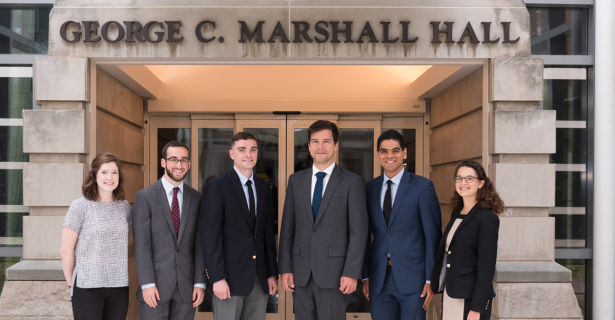The National Defense University feels a bit detached from your average Washington, DC national security institution. While the Capitol complex has multiple metro stops, and the Pentagon has a parking lot the size of the Tufts campus and an attached megamall, NDU is tucked away in a gentrifying neighborhood of the District of Columbia’s Southwest quarter. Every day, I walk almost a mile to the tucked away gate of Fort McNair, directly on the water. The fort was built to guard DC from flotillas of ships attacking up the Potomac, and has guarded in the same spot, overlooking the water, since 1791.
Alongside my newly found understanding of DC military basing history, interning at NDU has brought me a new understanding of the history of military decision making, and perhaps begun to explain why the military’s premier facility of joint higher education is hidden in the corner of our capital city. Students come to NDU at an average age of 40, after 18 to 22 years of professional experience. They learn from veterans of their same services and are exposed to the dilemmas of thinking through challenges of leadership on an interpersonal, but also strategic, level. NDU aspires to leave them with an understanding of the “big picture” of national security, one tied into the economic and diplomatic implications of military actions.
In the publication of the PRISM journal, which I have been assisting in a start-to-finish cycle, we struggle to connect the theoretical and strategic demands on these leaders to their everyday requirements. After attending NDU, and after most national security educations, leaders and students will return from top-level analysis to the mundane: filling out paperwork, making yearly plans and requesting yearly budgets, justifying action through monitoring and evaluation. Along the way, it’s easy to forget to keep learning, questioning, and approaching these immense and immovable institutions from an academic angle.
This process of critical thinking is closely tied to the work I’ve done through Tufts ALLIES, which collaborates across the undergraduate civil-military community to analyze national security problems which we could face in the “real world.” Chief among the lessons I’ve learned this summer is that it’s never, even in undergraduate education, too early to begin questioning the very system which you support and contribute your time towards. After all, if you don’t begin critical analysis and creative thought until your mid-career Masters, haven’t you likely missed something along the way? As I pack up for my next adventure (living abroad for a year in Jordan), I’m grateful for this opportunity to begin interrogating the institutions which got me where I am, and to begin making this system better for everyone in and around it.

